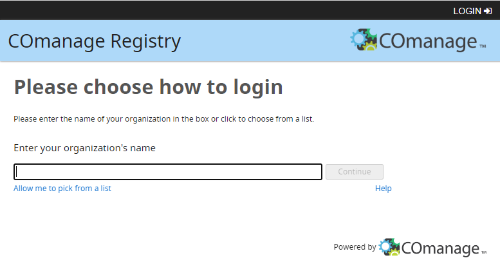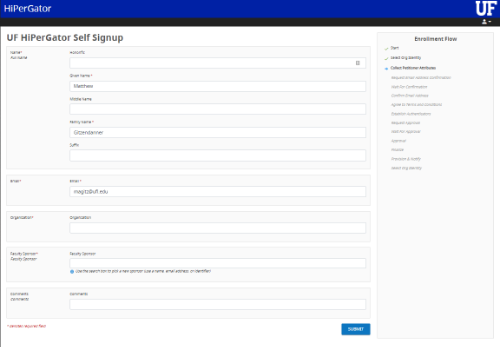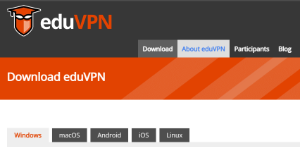Federated login: Difference between revisions
No edit summary |
No edit summary |
||
| Line 1: | Line 1: | ||
For users outside of the University of Florida, UF Research Computing has set up federated authentication so that users can access HiPerGator | For users outside of the University of Florida, UF Research Computing has set up federated authentication so that users can access HiPerGator using their institutional credentials. | ||
{{Note|Note that the processes described on this page are for individual researchers only. Instructors and students in a course will be handled in a different mechanism.|warn}} | {{Note|Note that the processes described on this page are for individual researchers only. Instructors and students in a course will be handled in a different mechanism.|warn}} | ||
Federated login is available for most [https://incommon.org/ InCommon member institutions]. You can verify that your institution provides federated authentication using [https://incommon.org/community-organizations/ | Federated login is available for most [https://incommon.org/ InCommon member institutions]. You can verify that your institution provides federated authentication using [https://incommon.org/community-organizations/ the InCommon Community Organizations page] and looking for the "Federation" tag. | ||
==Establishing a HiPerGator Account Using Federated Credentials== | ==Establishing a HiPerGator Account Using Federated Credentials== | ||
Revision as of 17:56, 1 September 2022
For users outside of the University of Florida, UF Research Computing has set up federated authentication so that users can access HiPerGator using their institutional credentials.
Federated login is available for most InCommon member institutions. You can verify that your institution provides federated authentication using the InCommon Community Organizations page and looking for the "Federation" tag.
Establishing a HiPerGator Account Using Federated Credentials
COmanage registration
- Start here: https://federation.it.ufl.edu/registry/co_petitions/start/coef:6
- Select institution to log in with, which will forward you to your institution's single sign on (SSO) page.

The COmanage registration page: enter your institution - After logging in, you will be presented with a form and need to fill out the following info:

The COmanage user registration page - Given Name
- Family Name
- Organization (i.e. institution name)
- Select a sponsor from the drop down.
- Add any comments they think are helpful for UFRC staff.
- Click Submit
- An email will be sent to you for the next steps.
Create SSH keys and upload public key for access
Follow these instructions for creating a public/private key pair on your local computer depending on your OS:
- Creating an SSH key on MacOS
- Run the command:
ssh-keygen -o -a 100 -t ed25519 -f ~/.ssh/id_ed25519 -C "Comment to make the key recognizable among many"
- Run the command:
- Creating an SSH key on Windows
- Creating an SSH key on Linux
- Run the command:
ssh-keygen -o -a 100 -t ed25519 -f ~/.ssh/id_ed25519 -C "Comment to make the key recognizable among many"
- Run the command:
The private key file should remain on your computer and not be shared with anyone. The public key file will be uploaded in the next step.
- After creating your SSH key and receiving the email invitation, click the link in the email
- Review the Terms and Conditions, click "I Agree" and "Submit".
- Click Choose File, select a public key (ends in .pub) and click "Upload"
- Once the SSH key has been uploaded, the account request process will proceed. The sponsor will be notified of the account request and will need to approve the request. At that point, the HiPerGator account can be created.
- Once your HiPerGator account has been created you will receive an email. At this point you will be able to connect to HiPerGator.
HiPerGator SSH Access via eduVPN
In order to access HiPerGator via SSH with a federated account you will need to connect via eduVPN.

- Download the latest version of the eduVPN client from https://www.eduvpn.org/client-apps/ and install it.
- After installing the eduVPN client, open the application.
- Search for and select the University of Florida. You will be presented with an InCommon login page.
- Select your institution from the dropdown and click Select. This will forward you to your institution's SSO page.
- After logging in, approve eduVPN access. You will now be connected to our instance of eduVPN.
- SSH to hpg.rc.ufl.edu using your SSH key:
- Your username will be indicated in the email you receive when your account is created.
- For command line:
ssh -p 2222 username@hpg.rc.ufl.edu